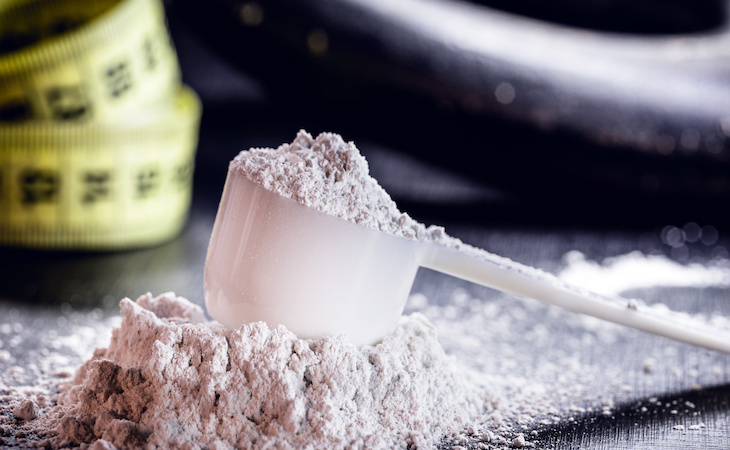
Creatine is a natural energy source that supports muscle growth and recovery. While widely used by athletes, studies suggest it may also aid sleep by reducing sleep disturbances and boosting cognitive function during sleep deprivation. It may benefit brain health, but potential side effects exist, especially for certain health conditions.
If you were to take a peek into the supplement cabinet of an athlete, fitness guru, or weekend warrior, you’d probably find a jar of creatine powder on the shelf.
Creatine is popular in the health and fitness world for its ability to strengthen muscles and quickly restore energy after a burst of exercise.
But this supplement isn’t just for athletes—creatine and sleep have increasingly proven to have a positive connection too. Take a look at the research we have so far about whether creatine helps you sleep.
What is creatine?
Creatine is a natural source of energy found in the body. It’s a compound that is made from three amino acids and supports muscle growth.
“Creatine comes in as a beautiful supplement that helps to replenish that energy that’s lost during that high-intensity exercise,” explains Suzanne Fisher, RD, LDN, registered dietitian and founder of Women’s Cycling Nutrition. “It gives you energy that is used after high-intensity exercise, like sprinting or something where you’re doing quick bursts of energy.”
You can get creatine in three ways: through your body, in your diet, and via additional supplementation. Your liver, kidneys, and pancreas produce creatine, which is then stored in your muscles. Good dietary sources of creatine include seafood, red meat, and poultry.
Creatine and sleep
Athletes often use creatine to build muscle and boost energy. There isn’t a lot of research in the field of sleep medicine. But there are studies that indicate a definite link between creatine supplements and catching some Z’s.
For example, one study looked at the effects of creatine supplementation on sleep regulation in rats. Researchers discovered that when rats received creatine, they showed a reduced need to sleep, suggesting that creatine could have therapeutic benefits for sleep-related disorders (although more research is needed with humans).
Another study suggested that creatine can help with cognition in someone who’s sleep-deprived, while a cross-sectional study indicated a link between adequate creatine consumption and reduced mild sleep disturbances.
“The last study was done in the field of women who are still menstruating in the field of sleep medicine,” says Fisher. “Those women seemed to have some positive effects from taking creatine.”
Bottom line: Does creatine help you sleep? The evidence so far suggests that creatine may not directly make you sleepy—but it can certainly play a supportive role in managing sleep-related challenges.
Researchers are still working to understand how creatine affects brain energy metabolism. But the literature so far indicates that creatine supplementation can reduce the brain’s perceived need for sleep, improve cognitive function during sleep deprivation, and even increase total sleep time after resistance training.
Other health benefits of creatine
Creatine holds other potential health benefits both big and small. We already know why athletes are such a fan of this supplement: Oral creatine can help reduce muscle cramps, build muscle mass, and quickly replenish energy.
But emerging research is revealing lesser-known benefits of this energy source too—such as “neurodegenerative diseases, cancer, [and] type 2 diabetes,” lists Fisher.
For example, although the relationship between creatine and cancer is a complex issue where more research is needed, one study showed that higher dietary creatine intake may reduce cancer risk.
And remember how we discussed creatine’s brain benefits? These may apply to people with concussions, depression, or traumatic brain injury—and maybe one day soon, Alzheimer’s disease.
Topical creatine might even help protect skin cells from aging-related damage linked to skin cancer.
Potential side effects of creatine
While creatine is generally considered safe to take, Fisher does note you should avoid adding creatine supplementation to your routine if you:
- Have kidney disease
- Have have diabetes
- Are taking an oral hypoglycemic agent to lower blood sugar
- Are pregnant or breastfeeding
“It definitely has not been tested enough with pregnant or breastfeeding people,” she adds. “Excess creatine, if you take too much, can tax the kidneys as well.”
According to an article from Mount Sinai, potential side effects of creatine may include:
- Weight gain
- Muscle cramps
- Muscle strains and pulls
- Stomach upset
- Diarrhea
- Dizziness
- High blood pressure
- Liver dysfunction
- Kidney damage
Regardless of your health status, you should always check with your doctor before introducing any new supplement into your diet—especially something like creatine. It’s best to err on the side of caution.
How to add creatine to your routine
To start taking creatine, you’ll need to follow a loading protocol—consuming more creatine at first before settling into a regular nightly dose. Fisher recommends the following dosage:
- Take 0.3 grams per kilogram of body weight for three to five days, broken into four to five smaller servings throughout the day.
- Hint: Kilograms = body weight / 2.2. For example, 150 lbs / 2.2 = 68 kilograms, so 68 x 0.3 = 20.4 grams of creatine per day during your loading phase.
- Then, start taking a single dose of 3 to 5 grams per day (start on the lower side and see how you tolerate it).
“Uptake by the muscle is best when it’s taken with a meal that has protein and carbs in it, not with an empty stomach,” says Fisher. She adds that you can take the supplement with dinner for creatine before sleep. Creatine comes in a powder and you can mix it with your preferred liquid (water, juice, milk, electrolyte solution).
However, be aware of where you’re getting your supplements from: “Make sure it’s NSF certified,” says Fisher. “This means the supplement doesn’t contain any substances that are banned by athletic organizations and it’s a pure product.”
FAQs
Does creatine affect sleep?
Yes. While more research is needed, studies have shown that creatine supplementation can reduce sleep disturbances and increase total sleep time after resistance training.
Is it OK to take creatine before sleep?
Yes, it’s OK to take creatine before sleep. Try taking your creatine supplement with dinner—it’s best not to take creatine on an empty stomach.
Is creatine good for your brain?
Yes! Studies have shown that creatine can improve cognitive function in sleep-deprived individuals.
Are there any negative effects of creatine?
Potential side effects of creatine may include symptoms like weight gain, muscle cramps, stomach upset, dizziness, liver dysfunction, and kidney damage.
What other ingredients might impact sleep? Next, learn about the sleep benefits of GABAand how to use it in your daily routine.
Hailey Hudson
Hailey Hudson is a full-time freelance writer and content marketer based out of Atlanta. She writes about healthcare, marketing, and pets for clients like Healthline, Adobe, and Chewy. In her spare time, Hailey writes YA novels, snuggles with her cat, and sings musical theater (not all at the same time).



